Over the past few years, WDI has been working with the Ruli District Hospital and The Ihangane Project to improve healthcare service delivery and operations in Rwanda’s Gakenke District. The Ihangane Project is invested in the improvement of health in the Ruli area, through the provision of material, clinical, and technical assistance to the Ruli District Hospital Health System and Ruli community members.
Based on specific requests from hospital leadership, University of Michigan student teams have worked on a variety of projects to improve communication flow, cost-effectiveness and the financial sustainability of the healthcare delivery system.
In 2016, a student team from the University of Michigan’s Ross School International Business Immersion course (BA685), facilitated a hospital staff retreat to create a shared vision of high quality and patient-centered healthcare at Ruli, including an implementable framework for decision-making and problem solving.
Karen Tam spent three months in Rwanda during the summer of 2009 as a WDI intern, returning in the fall to the University of Michigan with valuable work experience in a developing country, a lifetime of memories and a Rwandan nickname: Umutesi.
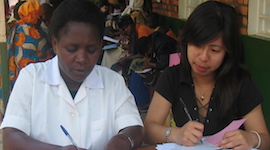
Translated as “treasured or valued one,” the name was given to Tam by both the nurses at the hospital where she worked and her host family. Tam, now a Washington, D.C.-based senior consultant for GE Healthcare’s Camden Group, lived with the family – a surgeon dad, two children and the mother Tam still affectionately calls “Mama Benita, who loved me like I was her own.” Living among the people she was working to serve, led to a better experience and better outcomes, Tam said.
“The best way to understand facing the community and recommend practical, actionable solutions is to get embedded,” she said. “It helps you perform so much better. I was a part of the community.”
Tam interned with the Access Project, which seeks to improve the care provided by medical facilities in Rwanda through investments in management, training and infrastructure. For her internship, Tam developed a business plan for scaling solutions to improve operational efficiencies for access the health clinics, pharmacies, and patient registration.
Tam, who was a dual degree master’s student at the Ross School of Business and the Ford School of Public Policy at the time, had studied abroad in Japan as a high school student and in Greece as a University of Chicago undergrad. But Rwanda was different.
“Working in a developing country, living in a developing country – that was life changing,” she said. “And when you’re working in a developing country, as opposed to just living in one, there are expectations. You have deliverables, you have to perform.”
Tam interned with WDI again the following summer, this time traveling to Bangladesh for GE Healthcare in partnership with Grameen Healthcare. She worked on the rural deployment of handheld ultrasound devices, gathering information on the ground for engineers regarding usability, determining clinical pathways for the machine and finding a sustainable business model to serve the poor while remaining profitable.
Unlike her time in Rwanda, her summer in Bangladesh was far more challenging. The support network she had in Rwanda didn’t exist in Bangladesh. Working for a corporation as opposed to a nonprofit was different. And she faced gender discrimination from some people in the field who preferred to hear from her male colleague.
Still, Tam said she was able to pull out positive learnings from her experiences in Bangladesh and gained new perspectives from the challenges there.
“It allowed me to be completely flexible and adaptable,” she said. “Certain things that offended me in the past, I let slide because I built up this thick skin. It taught me to exercise my abilities, stand my ground and be sure my opinion is heard.
“It upped my emotional intelligence, having to constantly do that on the ground. It helped me move forward in my career.”
Tam’s two WDI internships represented a practical way of combining her pre-medicine education as an undergrad, and her business and policy disciplines.
“On the outside, they can be conflicting,” she said. “But when you apply it properly and you have the right kind of conversation with the right kind of stakeholders, I really think that is super powerful.”
Seven years later, Tam occasionally hears from Mama Benita, who sends photos of her now-grown children. That summer working in Rwanda and living with her adopted family, Tam said, “will always hold a special place in my heart.”
It took an old folk story for Matt Brown, a faculty affiliate with WDI’s Education Initiative, to break through to his students — 30 female entrepreneurs from Rwanda — on how to write a business plan.
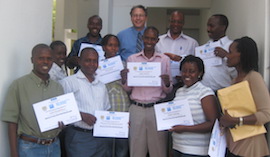
Brown, as part of a 10,000 Women entrepreneurship program sponsored by Goldman Sachs and organized by WDI in Rwanda, was talking to the women about creating an “elevator pitch,” a common Western practice that helps entrepreneurs condense their business mission to the duration of an elevator ride. But as Brown soon found out, sharing details of one’s business with others is taboo in Rwanda.
Instead, Brown knew the women responded well to story examples so he began talking about “Stone Soup,” the folk story in which villagers combine their simple resources and end up creating a wonderful, rich soup. Brown told the women that the tale represented their entrepreneurial spirit and telling their business story could be like making stone soup. They then broke into small groups and encouraged each other on how to better to describe their business and entrepreneurial journey.
Brown, a Management and Organization faculty member at UM’s Ross School of Business, recounts the “stone soup” anecdote in an article he recently wrote, “Teaching and Learning with Rwandan Women Entrepreneurs,” which details how he tailored U.S.-style business curriculum to fit the needs of the women. Read the paper here.
The paper “is the story of how my instructional approach developed during a four-year process, how my teaching practices further evolved, and how I have learned some important lessons to apply to my domestic teaching and learning,” Brown wrote.
Started in September 2008, the six-month entrepreneurship training program was designed for women across Rwanda interested in growing their small- or medium-sized business. Participants learned about marketing, strategy, accounting, financial management and loans, negotiations, and how to create a detailed business plan, among other modules. In all, 330 women completed the Rwanda program by the time it concluded in 2014.
Brown joined the program as a faculty affiliate in 2009 and taught the first module for each new cohort, which included an overview of the training objectives and the elements of a business plan. He also would gauge the instructional needs of the women and pass that information along to instructors, who would teach future modules.
In the paper, Brown outlines the changes and adaptations he made so the lessons were relatable and understandable to the women. For example, a conventional U.S. business plan template includes topics such as executive summary, competitive advantage, and exit strategy. For the Rwanda program, those were changed to “How do you describe your business,” “What do you really need to grow?,” and “Why do you stay in this business?,” respectively.
Also, some business terms were not easily translatable from English to the women’s native language, Kinyarwanda.
“We paid careful attention to how to better address cultural interpretations of common business concepts and variations of understanding with respect to basic business plan elements,” Brown wrote. “Many of the technical business terms were wholly unfamiliar and unclear to the Rwandan businesswomen.”
Despite the challenges, Brown said his time working with the women was “one of the best experiences of my teaching career.” He made 11 visits to the country over a three-year period.
He marveled how well the women collaborated during exercises, how they wanted to succeed not so much for the money but instead as a way to serve their community. He also loved their “joy of spirit,” shown daily by their singing, clapping and dancing during breaks. Brown would often join in and felt “invigorated” for the next class session.
At the end of his article, Brown recounts watching one of the cohorts graduate while seated next to Rwanda’s First Lady Jeannette Nyiramongi Kagame, wife of Rwanda President Paul Kagame. During the ceremony, the women began singing, causing Kagame to tell Brown “they are singing for you.” While singing, the women waved to Brown and yelled out “stone soup.”
“I was practically reduced to tears and in the moment all I could do is touch my heart with my hand,” he wrote. “I felt so truly grateful to them; they were so full of joy. Where I saw business challenges, complex problems to solve, and lessons to convey, they saw joy and laughter and the power and impact of their new learning. The Rwandan women taught me lessons that I keep in my heart forever because they rekindled the entrepreneurial spirit within me as well.”
Entrepreneurship programs are most commonly – and rightly – reported using data, numbers, and occasional testimonials and student spotlights. Rarely do programs receive extended analysis – especially from the vantage point of the instructor. Recently, however, WDI Faculty Affiliate Matthew Brown published his experience teaching in Rwanda as part of the Goldman Sachs 10,000 Entrepreneurship Training Women Program. In a WDI Education Article Series piece, Brown reflects on how his instructional approach developed during a four-year process, how his teaching practices further evolved, and what important lessons he’s applied to his domestic teaching and learning. Brown calls the 10,000 Women program “one of the best experiences of my teaching career.”
In a first for WDI, two managers visited Cuba last month to assess how the Institute could assist the country’s burgeoning entrepreneur community.
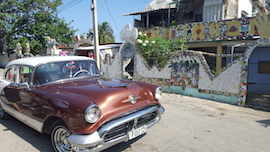
Amy Gillett, vice president of the Education Initiative, and Diana Paez-Cook, senior program manager of the Grants Management team, were part of a 20-person delegation that traveled to the island nation in May as part of a culture and policy trip organized by the travel company Insider Expeditions. Many on the trip were lawyers, policy development professionals, and lobbyists who hoped to learn more about Cuba’s economic transition.
That transition is slowly developing in the wake of renewed diplomatic ties between Cuba and the United States, and President Barack Obama’s historic trip to Havana in March. While it still operates a largely state-controlled economic system, the Cuban government has begun to make changes by permitting more of its citizens to operate private businesses.
WDI was founded in 1992 shortly after the collapse of communism in the Soviet Union as a way to help firms and organizations in formerly closed economies transition to a more free market economy. Cuba is viewed as the last of the Soviet bloc countries to transition to a more open economy.
Over the years, WDI has provided entrepreneurship training in Morocco, Rwanda, and Bahrain, and delivered business education training workshops to thousands of managers in former Soviet bloc countries.
Paez-Cook said the visit she and Gillett made to Cuba was invaluable because of the knowledge gained about the current situation on the ground and the connections made during the visit. She said the pair has a much better understanding of Cuba, which is “its own unique universe.”
While WDI typically works in partnership with local organizations to provide entrepreneurship training and other programs, the current system in Cuba has prevented the development of an organized civil society. A traditional approach of seeking out a partnership with an NGO will therefore not be viable at this time. Instead, Paez-Cook said WDI would need to cultivate relationships with individuals, educational institutions, and other entities to find ways to engage and support the transition.
Another factor on how open Cuba becomes is the outcome of the U.S. presidential elections. The next president will have the opportunity to build on the progress made by the Obama administration and work with the successor to current Cuban president Raul Castro, who plans to step down in 2018.
Paez-Cook said WDI will explore opportunities for engagement over the next few months.
“As economic and policy changes continue in Cuba in the medium- to long-term, entrepreneurship training and technical assistance could go a long way in providing Cuban entrepreneurs with tools and techniques to sustain successful businesses,” she said. “That said, any entrepreneurship program in Cuba would have to be uniquely tailored to the current context and conditions, and leverage the amazing creativity and resourcefulness of the Cuban people. It will be important to work in partnership with Cubans every step of the way to assist with their needs and learn from them as well.”
 Gillett said she was struck by the entrepreneurial spirit among Cubans, who are very interested in potential economic opportunities. She encountered a man who had a license from the Cuban government to operate a coconut water stand. Since resources are severely limited, the vendor works with what he can find, including the coconuts he harvests from nearby trees.
Gillett said she was struck by the entrepreneurial spirit among Cubans, who are very interested in potential economic opportunities. She encountered a man who had a license from the Cuban government to operate a coconut water stand. Since resources are severely limited, the vendor works with what he can find, including the coconuts he harvests from nearby trees.
“After meeting small-scale entrepreneurs and gaining a deeper understanding of the economic situation, we’re in a great position to start developing ways to help entrepreneurs move their businesses to the next level,” she said. “The resourcefulness and can-do spirit of the entrepreneurs we met was truly impressive. We saw many examples of business owners running creative businesses despite the lack of resources and raw materials available on the island.
“I believe that further access to materials and to business training would provide a huge lift to entrepreneurs in Cuba and a much needed stimulus to the Cuban economy.”
Each summer, as part of its mission to provide high-quality learning opportunities to University of Michigan students, WDI sponsors interns who work overseas with international organizations.
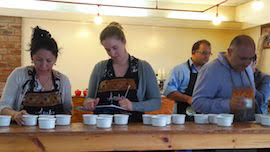
This year, five U-M graduate students representing five different schools across campus are working in the education, healthcare and poverty alleviation fields. The projects are based in Ghana, Rwanda, Ethiopia, India, Peru and the Philippines.
In addition to providing the students with meaningful business and cultural experience that comes with working internationally, the summer internships also provide WDI’s five initiatives with important insights from the field. This summer’s internships are managed in collaboration with WDI’s Performance Measurement Initiative (PMI), Education Initiative, and Healthcare Initiative.
“The PMI team is excited to provide measurement advice and support to WDI’s interns, learn from their related experiences, and apply those learnings to current and future projects,” said PMI Program Manager Heather Esper. “In particular, we are interested in learning more from the Pearson Affordable Learning Fund/ Affordable Private Education Centres internship in the Philippines. (Learn more about these projects below). Implementing and institutionalizing a new measurement system centered on learning, and conducting demand analyses and customer segmentation are both areas of great interest to our partners.”
Here are the interns and their projects.
Naomi Wilson, School of Education
Organization: Pearson Affordable Learning Fund (PALF) in partnership with Omega Schools
Country: Ghana
PALF makes minority equity investments in for-profit companies to meet the growing demand for affordable education across emerging market countries. Their vision is to help millions of children in the world access a quality education in a cost effective, profitable and scalable manner. Additionally, organization wants to demonstrate to governments and donors that private education can help to educate their youngest citizens in an efficient way.
Omega Schools is a chain of affordable schools in Ghana delivering quality education affordably to 15,000 low-income students.
As Omega continues its growth, it needs a structured, evidence-based, and easy-to-use software tool for selecting new school sites and determining what price point would be appropriate for specific locations. Wilson will research similar tools already in place, analyze enrollment and profitability of current schools, visit current and potential school site and identify key factors to be considered in site selection.
Michael Manansala, Ford School of Public Policy
Organization: PALF in partnership with Affordable Private Education Centres (APEC)
Country: The Philippines
APEC is a chain of affordable, high-quality secondary schools based in metro Manila focused on employability and life skills.
Manansala will aim to improve annual student assessment and quarterly academic reporting by analyzing existing student performance data and benchmarking it against publicly available data to determine learning outcomes. He also will review existing research and conduct a series of qualitative customer interviews and quantitative customer surveys to better understand why some parents send their children to APEC while others don’t.
Carissa De Young, Ross School of Business/School of Natural Resources and Environment
Organization: Shared-X
Country: Peru
Shared-X is a for-profit, startup social impact business in its first year of operation. It works to lift thousands of farmers out of extreme poverty by deploying advanced farming techniques on highly productive land to close the agricultural yield gap between developed and developing nations. Through the direct sale of specialty crops to international markets, Shared-X provides social, environmental, and economic benefits to local farming communities and generates strong returns for shareholders. Shared-X operates test farms that demonstrate best farming practices and secure contracts for its crops. It then expands access to its technology and markets to smallholder farmers in surrounding communities.
De Young will design a strategy to measure, communicate, and expand the social impact of Shared-X’s model of engagement with smallholder farmers. She will identify and measure impact by conducting interviews with stakeholders and experts ranging from current and potential future cooperative members, Shared-X personnel, and leaders in similar companies. She will then compare her findings with industry best practices to create a proposal for key performance indicators.
De Young also will identify a pathway to continue replicating the Shared-X model with additional smallholder farmers in other regions where Shared-X farms exist.
Elisabeth Michel, School of Public Health
Organization: The Ihangane Project (TIP)
Country: Rwanda
TIP empowers local communities to develop sustainable, effective, and patient-centered health care delivery systems that holistically respond to the needs of vulnerable populations. It envisions a world in which quality health care leads to healthy, inclusive, and empowered communities. TIP has been working with Ruli District Hospital in Rwanda and its seven associated health centers to determine key strategies for improving health outcomes within the community.
Michel will facilitate a successful hospital retreat that creates a shared vision of high-quality and patient-centered health care at Ruli, and includes an implementable framework for decision-making and problem solving. She also will help the hospital staff implement recommendations that come from the retreat.
Dilparinder Singh, Ross School of Business
Organization: PATH
Countries: India and Ethiopia
PATH is a Seattle-based international, nonprofit health organization that creates sustainable, culturally relevant solutions, enabling communities worldwide to break long-standing cycles of poor health. PATH is one of many global health organizations working with countries to reduce malaria deaths.
Singh will work with PATH to conduct a market landscape of current malaria testing and treatment algorithms in Ethiopia. He also will work with PATH’s India Innovation Hub, which encourages innovative approaches to healthcare.
Note: This is one in an ongoing series of articles profiling past WDI interns and Multidisciplinary Action Project (MAP) team members and their career paths. Additional profiles in the series may be found here.
On June 17th, Zara Ahmed will take a moment during her hectic day to stop and think about a young girl living in a small, rural village in southwest Cameroon. It is something she has done every June 17th since 2008 when she was a WDI summer intern working for a public health nonprofit and helped a woman give birth to a baby girl who would then be named after her.
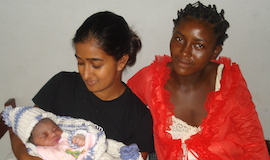
“I think back to that day and wish her a happy birthday,” said Ahmed, now the Senior Policy Advisor for Health Systems and Sustainability for the U.S. Centers for Disease Control and Prevention (CDC) in Haiti. “I wish her a future more like my own, full of opportunity, choice, support, and love.”
Despite Ahmed’s wishes, she realizes it is likely that her namesake will have a difficult life. Baby Zara’s mother was 21 when she gave birth to her third daughter, to go along with one son. Ahmed helped clean the baby after her birth with palm oil, the only clean liquid available at the minimally-equipped, one-nurse clinic.
Baby Zara’s mom was so certain she was going to have a boy that she planned to name him after Ahmed’s brother, Zamir. When Zara was born, her mother was concerned her husband – about 20 years her senior – would not be happy with another girl, and initially ignored the newborn.
Her husband eventually visited and begrudgingly gave his approval. Baby Zara’s mother began to bond with her new daughter, but talked excitedly about giving birth next to a son.
“This experience breaks my heart every time I think of it, which is quite often,” Ahmed said. “Baby Zara was born into a family that had few resources to offer her beyond their love. She was born into a life with few prospects, will likely have little education, suffer from preventable diseases, marry early, and endure risky pregnancies and childbirth of her own.
“She will not be afforded the same privileges I have – proper nutrition, years of schooling, advanced health care, reproductive choices – unless our world dramatically changes for the better.”
Trying to make the world a better, healthier place has been Ahmed’s work since graduating from the University of Michigan in 2009 with dual master’s degrees in public policy and public health. After graduation, she spent several months in Bangladesh as a consultant with the U-M President’s Advisory Committee on Labor Standards and Human Rights looking at issues of female migrant worker rights and conditions in the factories where U-M-branded goods were produced.
While in Bangladesh, she was selected for a CDC global health fellowship. She took a position on the CDC’s Health Systems Strengthening team in Rwanda in fall 2009, and on her first day was put to work on the then re-emerging H1N1 swine flu outbreak. Two days later she was part of the group briefing the country’s Minister of Health.
She was later named Health Systems Strengthening Advisor and became a CDC contractor. After three years in Rwanda, she moved to Namibia to become the CDC Health Policy and Communications Team Lead. Two years later, she moved to Haiti and assumed her current role.
All this moving around is nothing new for Ahmed, who was born in Scotland, moved to the U.S. at age 3, went to Brown University in Rhode Island for her undergraduate studies and then to U-M. “At 31, I am currently living in my 27th house so I’ve gotten quite good at packing and moving,” she said.
She originally came to Michigan to get dual degrees in public policy and social work. But she soon realized that the intersection of public policy and public health “spoke to my real interests and passions.”
During her second year at U-M, Ahmed was looking for funding for a public health internship and talked to several friends at the Ross School of Business who spoke highly of WDI and its support for students – particularly those pursuing innovative collaborations or projects.
“From the start, the team at WDI was extremely supportive, professional, and enthusiastic,” Ahmed said. “It felt like a perfect match for me.”
Her 2008 WDI-supported internship was with a group called Peacework based in rural, southwestern Cameroon along the Nigeria border. Working through a local partner, United Action for Children, Ahmed’s primary job was to assess the local public health capacity. She used information on burden of disease, demand for services, availability of resources, and other factors to develop a plan to revitalize health clinics that had lost their funding due to donor withdrawals.
She explored several models, including community-based financing and public-private partnerships. She interviewed dozens of patients and providers, and visited approximately 20 health clinics, often walking from village to village because most of the roads were washed out. She regularly spent several days at a stretch in a single clinic, sleeping on a cot or the floor.
The daughter of a physician and a medical practice administrator, Ahmed thought she was familiar with the basics of health care financing and management going into her internship.
“The daily issues that come up when running a one- or two-person health center in a remote village are hard to imagine until you’ve seen them up close,” she said. “More than interviews with staff or reviews of facility records, simply observing the rhythms of the clinics, the comings and goings of patients and friends, the role clinics play in villages of a few hundred people, and the innovative problem-solving of the staff taught me so much about leadership, management, and resilience. Those observations provided a crash course in the business of health care at the most decentralized level where people’s critical, basic needs are met.”
Those experiences in Cameroon – coupled with Ahmed’s other international experiences at U-M in Cambodia, Bangladesh and Senegal – continue to inspire and provide guidance in her current role at the CDC. Today, she is engaged in all aspects of policy, planning, strategy, and coordination of CDC’s work in Haiti. As a result, she works closely with CDC Haiti’s management, technical, and operations teams and the organization’s headquarters in Atlanta. She also interacts with numerous U.S. government agencies, such as USAID and the Departments of State, Defense, and Treasury, and global partners such as the World Bank, World Health Organization, and the Global Fund.
Ahmed said she often reflects on “the twists and turns of fate” that got her to Haiti, including her WDI internship in Cameroon. That experience, along with the others, “grounded me in the realities of global health, policy, and development, and gave me insight into various ways of thinking about issues across cultures and professions. Those skills and experiences made me a much better candidate in the job market, as I truly grasped the challenges and opportunities facing organizations like the CDC,” she said.
Her globetrotting ways are not for everyone, she said. Living and working overseas can be lonely, isolating and exhausting. But it also can be rewarding, stimulating, and enlightening. In the end, she said, you never know if living and working abroad, with its new situations and cultures, is for you until you try it.
“When I was a student at U-M applying for internships, never could I have imagined that I would be trudging through muddy, washed-out roads in the forests along the Cameroonian-Nigerian border having just helped deliver, in a one-room health clinic, a baby named after me,” she said. “That fact alone is proof that I don’t know what’s in store for my life and career, and something that I think about to this day.”
WDI faculty affiliate Matt Brown is scheduled to travel to Bahrain in May for the next phase of an entrepreneurship training program started in 2014 and designed by WDI in partnership with the Washington, D.C.-based Center for International Private Enterprise (CIPE) to not only increase the number of entrepreneurs in the country, but also give them the needed support to ensure their success.
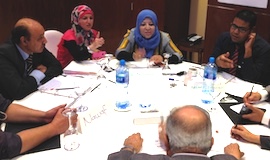
CIPE’s work in Bahrain, sponsored by the U.S. State Department’s Middle East Partnership Initiative (MEPI), has focused on the immediate need to improve the capabilities of trainers in the entrepreneurship program, and introduce elements of leadership, critical thinking and analysis, ethics and decision-making into the program’s curriculum.
It will be Brown’s second trip to Bahrain, an island nation in the Persian Gulf. His trip is a follow-up to his previous work there in March on how to mentor entrepreneurs.
WDI’s early work in Bahrain centered on entrepreneurship training. Bahrain had started several entrepreneurship initiatives in recent years unique to the region. However, these initiatives have gaps, including a lack of qualified entrepreneurship trainers to deliver the training programs.
To fill that gap, CIPE – which has worked in Bahrain to promote entrepreneurship – asked WDI to develop an entrepreneurship instructor’s manual and leadership curriculum to strengthen the delivery by trainers of Bahrain’s entrepreneurship initiatives.
The training materials incorporate leadership, critical thinking, active citizenship, ethics, and decision-making techniques into the existing curricula. It is used in the training of Bahrain’s trainers, and subsequently by the trainers in their entrepreneurship education programs. The materials incorporate leading practices applied to the unique Bahraini context, and was informed by input generated by a needs assessment survey and CIPE’s Bahraini stakeholders.
Julie Felker, a WDI faculty affiliate, wrote the leadership curriculum. She traveled to Bahrain in December 2014 to hold a workshop for trainers involved in Bahrain’s entrepreneurship initiatives and education programs to implement the training in conjunction with CIPE. Felker’s workshop included discussions on leading practices that were part of the newly developed materials and was tailored to address the needs of the Bahraini trainers.
In March 2015, Peter Scott, professor of entrepreneurship at the Whitman School of Management at Syracuse University and author of the 20-page entrepreneurial training guide, went to Bahrain. The guide provides skills, “how to” examples, and resources to teach entrepreneurship and make the process experiential, or real, for the student.
Bahrain has a reasonably developed entrepreneurship training ecosystem, Scott said. Several Bahraini universities have faculty dedicated to entrepreneurship, and they are excited and motivated to teach the subject. However, they do not have much considerable academic or practical experience on the subject.
Scott said WDI’s work in entrepreneur mentoring is a good complement to the earlier entrepreneurship training. Teaching entrepreneurship is only a small part of starting companies.
“At the specific entrepreneur level, company founders also need mentorship, funding and coaching advice,” he said.
Scott said the trainers he trained were very interested in learning more about design thinking, a human-centered approach to problem solving.
“Solving a big problem that a given group of people has is really the best way to start a company,” he said. “Even something as common as Facebook was started because the founder was trying to solve a problem he experienced.”
In May, Brown will meet with representatives from Tamkeen, a business incubator in Bahrain tasked with developing the country’s private sector. He will deliver a two-day “train the trainer” workshop for these representatives so they can mentor new and existing Bahraini entrepreneurs.
When Brown traveled to Bahrain in March, he brought along a comprehensive entrepreneur mentoring guide he developed to help Tamkeen officials create a program specifically for Bahrain entrepreneurs.
Entrepreneur mentoring is akin to advising an entrepreneur with the express purpose of elevating the mentee’s experience and success, Brown said.
“Having an entrepreneurship mentor is an essential asset to any developing enterprise,” he said. “Mentors can act as sentinels looking out at the horizon helping to identify potential threats and exploitable opportunities. Mentors can also serve as sanctuaries, a safe harbor where ideas can be openly shared and deeply explored.”
WDI’s entrepreneurship training, mentorship training and capacity-building work in Bahrain is one of the institute’s key focus areas, and builds on one of its areas of strength and expertise.
The Bahrain project builds on WDI’s long track record of providing entrepreneurship education in emerging markets. Working with Goldman Sachs’ 10,000 Women project, WDI designed and delivered 12, six-month entrepreneurship programs at the College of Business and Economics at the University of Rwanda in Kigali. In all, more than 300 women graduated from the program, which included modules on “Introduction to Business Strategies,” “Marketing, Negotiations & Customer Care,” “Operating a Business in Rwanda,” “Budgeting & Management Accounting,” “Financial Management & Loans” and “Developing a Successful Business Plan.”
And in 2004, the MEPI office awarded WDI a grant to provide training for entrepreneurs from throughout Morocco. The training consisted of sessions in marketing, strategy, accounting, finance and exporting. The grant was renewed the following year based on successful delivery. WDI partnered with Moroccan-based Al-Akhawayn University to offer a total of six training programs in Morocco.
Kerry Shields worked in the healthcare industry before coming to U-M’s Ross School of Business for her MBA and has plans to return to it after graduation. So she was eager to find a MAP (Multidisciplinary Action Project) in a different industry, and was ecstatic when she learned she was part of the WDI-sponsored MBA student team working with the Relationship Coffee Institute and Sustainable Harvest in Rwanda.
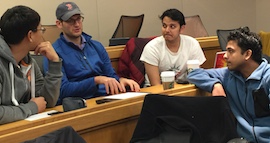
The Relationship Coffee Institute (RCI) is a nonprofit, public benefit corporation – or, B Corp – working to increase social and economic opportunity for smallholder commodity farmers and their families. Its partner, Sustainable Harvest, is one of the largest importers of fair trade specialty coffee in the U.S.
“What this company is trying to do is important and innovative and I can learn from that,” she said. “Hopefully we will have had an impact at the end of the project and get a better understanding how a private company can help alleviate poverty.”
The MAP in Rwanda is one of eight student projects organized and sponsored by WDI. MAP is an action-based learning course offered at Ross for MBA students who receive guidance from their faculty advisors. Each project requires analytical rigor, critical thinking, and teamwork. Sponsors receive top-notch deliverables and data-driven recommendations from the team of students.
After learning about their projects and conducting research in the classroom for several weeks, the students then spend three to four weeks working alongside their project sponsors in the field.
Sylvia Jimenez will work on a WDI-sponsored MAP team for CARE, a non-profit organization seeking to use business approaches to address social issues.
“I’m looking forward to getting out of my comfort zone and doing something different than I have done before,” she said. “I think I’ll learn a lot about me as a team player, and learn about my teammates and what their strengths are.”
Ted London, vice president of WDI’s Scaling Impact Initiative, is one of the faculty advisors on the Sustainable Harvest and CARE MAPs as well as two others. Before the teams traveled to their destinations for on-the-ground work, he brought them together for a special WDI-focused session to get to know each other better before they left and to touch on some of the key issues the teams will face in the field.
He discussed what it takes to conduct good interviews, particularly in a base of the pyramid (BoP) market context, emphasizing that the goal of these interviews is to develop data-driven recommendations. Among other things, he also told the students to approach people they meet and interview with respect and humility to maximize the depth and quality of the data collected during the interview.
“You are not only there as expert problem-solvers, but also as experts in learning and listening,” he said. “Only by collaborating and co-creating can we build solutions that really work.”
London said his MAP projects allow students to take what they learned in the classroom and apply it in a BoP context.
“For students interested in working in this space as a career, it is an amazing opportunity,” he said. “These MAPs open students’ eyes to this part of the world and to this scale of enterprise and impact. They’re part of the minority seeing how the majority of the world conducts business.”
WDI and its partners get value from the experience as well, London said. Seven of the eight MAP projects are with partners that have long-term relationships with WDI.
“By leveraging MAP and the great skills of the Ross students, we’re providing resources and expertise to our partners to help them solve the problems they’re facing,” London said. “And it’s a way for us to collaborate with partners in the field, apply our knowledge, and learn what are the next-generation tools we need to think about in the future.”
Here is a summary of each MAP project:
Aravind Eye Care System – India
Advised By: Paul Clyde, WDI and Ross School of Business; Peter Lenk, Ross School of Business
MAP Team: Jackie Barnum, Katie Redman, Alex Kravitz, Matt Tafoya
Aravind Eye Care System (AECS) has five tertiary care centers, six secondary care centers, six community clinics, and 54 primary eye care centers across the Tamil Nadu state in India. Now AECS is expanding, opening tertiary hospitals in Chennai and Tirupathi in the next couple of years, and there are also plans to expand the services/facilities in the existing hospital units.
The student team will customize and test at two to three AECS facilities an existing process model that will measure performance of each unit and is understandable to everyone in the organization.
Cooperative for Assistance and Relief Everywhere (CARE) – India
Advised By: Ted London, WDI and Ross School of Business; Jane Dutton, Ross School of Business
MAP Team: Karina Cabanillas, David Chang, Takashi Takizawa, Sylvia Jimenez
CARE has been working in India for over 65 years, focusing on ending poverty and social injustice. Its overall goal is the empowerment of women and girls from poor and marginalized communities leading to improvement in their lives and livelihoods.
Most smallholder farmers, a vast majority of whom are women, have limited access to quality and affordable agriculture input, services, finance and technologies. The student team will develop a profitable and socially inclusive business plan that CARE can execute in 2016 that facilitates access for smallholder farmers to inputs and related services. This should be a commercially viable and financially sustainable approach that avoids donor dependency through the development of an agricultural input supply social enterprise in India.
Sustainable Harvest & Relationship Coffee Institute – United States
Advised By: Ted London, WDI and Ross School of Business; Ravi Anupindi, WDI and Ross School of Business
MAP Team: Stacey Nathan, Whitney Augustine, Erdem Eray, Grant Cowherd
Sustainable Harvest of Portland, Ore. is an importer of high quality, specialty grade coffees from smallholder farmers from 15 countries around the world. In 2012, Sustainable Harvest formed a nonprofit organization, the Relationship Coffee Institute (RCI), to help propagate its business model and advance farmer training. In fall 2015, in conjunction with RCI and 4,000 women farmers in Rwanda, Sustainable Harvest launched Question Coffee, which represents its fundamental goal to empower coffee farmers and foster sustainable supply chains. It is Sustainable Harvest’s first B Corp certified product throughout the entire value chain, meaning it’s a for-profit entity that includes positive impacts on society, workers, and the environment. Net proceeds from Question Coffee go to farmer training, which contributes to better quality, improved yields and increased income and wellbeing for coffee farmers at the base of the pyramid.
The student team will conduct research to identify Question Coffee’s value proposition to consumers, resulting in several specific, actionable recommendations on branding and marketing strategies. The team also will devise several recommendations and strategies for greater market penetration.
Relationship Coffee Institute (in partnership with Sustainable Harvest) – Rwanda
Advised By: Ted London, WDI and the Ross School of Business; Jane Dutton, Ross School of Business
MAP Team: Courtney Landy, Aaron Whallon, Juan Marino, Kerry Shields
For this project, the student team will test and evaluate the value of B Corp certification to see if it could improve the lives of smallholder farmers in Rwanda, and how it could be scaled or applied to other commodities.
Zemen Bank – Ethiopia
Advised By: Paul Clyde, WDI and Ross School of Business; Bob Dittmar, Ross School of Business
MAP Team: Dana Yerace, Max Jacobson, Florence Noel, Nicholas Mencher
Zemen is a commercial bank located in Addis Ababa, Ethiopia. Its vision is to bring new dynamism to the financial sector and the banking business in Ethiopia. It is interested in serving small- and medium-sized enterprises (SMEs). Using a banking scheme in which Ethiopians living in the U.S. could put a hold on some monetary amount in their bank account, Zemen would then access the account for a low interest loan for Ethiopian citizens starting or expanding a small business. The hold on the U.S. bank would be reduced as the loan is paid back.
The student team will develop the business case for diaspora SME loans and assess the prospects for scaling the program to a level that would interest Zemen Bank. If the scheme were deemed viable, then the team would formulate a plan for executing the program.
Imperial Health Sciences (IHS) – South Africa
Advised By: Paul Clyde, WDI and Ross School of Business; Ravi Anupindi, WDI and Ross School of Business
MAP Team: Amit Patel, Jennifer Paxton, Anuja Mehta, Aric Adams
IHS provides supply chain solutions to the public and private pharmaceutical markets in Africa. IHS and the Imperial Logistics group have adopted the Unjani project as its Corporate Social Responsibility project. Unjani aims to establish a network of nurse-owned franchise clinics in historically underserved communities across South Africa. It has 19 operating clinics with plans to add 25 more by May. The group will take over an independent, failing clinic.
The student team will assess the change in the failing clinic’s success level after instituting the processes, controls, training, and marketing of the Unjani franchise network. Examining the operational and environmental factors of the clinic, along with some financial analysis, will allow IHS to better understand why this clinic failed. That will help IHS further develop the Unjani concept and ensure successful clinics in the future.
ITC Ltd. – India
Advised By: Ted London, WDI and Ross School of Business; Venkatram Ramaswany, Ross School of Business
MAP Team: Nishant Agrawal, Kee Cho, Arun Prakash, Dave Teebagy
ITC is a major diversified Indian conglomerate. ITC’s e-Choupal initiative is enabling Indian agriculture to enhance its competitiveness by empowering Indian farmers through the power of the Internet. The initiative facilitates the two-way flow of goods and services in and out of villages, and describes itself as the largest Internet-based intervention in rural India by a corporate entity.
The student team will help ITC design the next version of e-Choupal. The team will deliver a report exploring how the first three versions of e-Choupal have created value and where further opportunities for value creation may exist. The team also will look into how other models of rural farmer engagement are being deployed in other developing countries, identify the various stakeholders impacted, and highlight how the proposed model creates value for them.
Aparajitha Foundation – India
Advised By: Paul Clyde, WDI and Ross School of Business; Jim Walsh, Ross School of Business
MAP Team: Jamyle Michael, Holly Price, Aaron Steiner, Meghan Sheehan
The Aparajitha Foundation is an arm of the Aparajitha Group. It is committed to the cause of creating transformational change in adolescents by using audiovisual technology to deliver life skills training to economically disadvantaged children in India’s Tamil Nadu state.
The MAP team will develop a complete business plan for entrepreneurship education, training and development. The model should be scalable so that it can be used across the country in the future.
Derek Johnson, director for development and sustainability for the U.S.-based nonprofit charity CURE that operates 10 hospitals in developing countries, recently spoke to students enrolled in the Ross School of Business travel-study course on healthcare delivery in emerging markets.
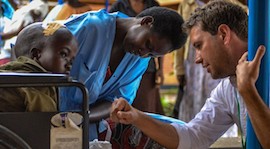
Students in the class spent the first part of the semester learning about the topic through case discussions, lectures, and guest speakers such as Johnson. The class then split into five groups and traveled to India, Rwanda, Sri Lanka and Ethiopia to work on business and health projects with local partners.
WDI President Paul Clyde teaches the course, which is comprised of mostly Ross MBA students.
While on campus, Johnson spoke with NextBillion Health Care Editor Kyle Poplin who wrote about the organization and its work. Additionally, Johnson recorded a short video interview with NextBillion, an initiative of WDI, which appears at the end of Poplin’s article.
Johnson’s presentation to the travel-study class also was recorded.
Photo courtesy of CURE.